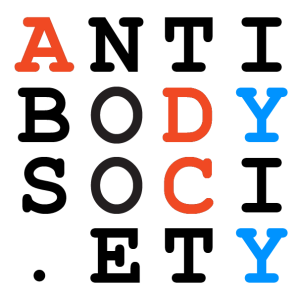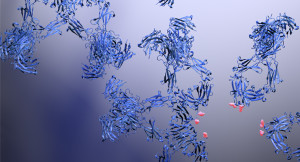 In the second half of May several companies reported important progress on their therapeutic ADC products. The Dutch pharmaceutical company Synthon initiated the second phase of the ongoing phase I clinical trial with its investigational anti-HER2 ADC SYD985. During the first part patients with solid tumors of any origin were enrolled. Promising results were obtained in this dose-finding part of the trial in 33 cancer patients who were dosed with between 0.3 and 2.4 mg/kg of SYD985 every three weeks. Very high response rates and durable responses were observed at doses from 1.2 mg/kg onwards in patients whose cancers were refractory to HER2-targeted agents, including Herceptin® and Kadcyla®. The second part will see 48 additional heavily pre-treated patients with HER2-positive breast cancer enrolled into the Phase I trial. This marked a significant next step in the development of SYD985, the frontrunner of the company’s duocarmycin-based ADC platform.
In the second half of May several companies reported important progress on their therapeutic ADC products. The Dutch pharmaceutical company Synthon initiated the second phase of the ongoing phase I clinical trial with its investigational anti-HER2 ADC SYD985. During the first part patients with solid tumors of any origin were enrolled. Promising results were obtained in this dose-finding part of the trial in 33 cancer patients who were dosed with between 0.3 and 2.4 mg/kg of SYD985 every three weeks. Very high response rates and durable responses were observed at doses from 1.2 mg/kg onwards in patients whose cancers were refractory to HER2-targeted agents, including Herceptin® and Kadcyla®. The second part will see 48 additional heavily pre-treated patients with HER2-positive breast cancer enrolled into the Phase I trial. This marked a significant next step in the development of SYD985, the frontrunner of the company’s duocarmycin-based ADC platform.
Atezolizumab: 4th mAb granted a first approval in 2016
 On May 18, 2016, anti-PD-L1 atezolizumab (Tecentriq®) was approved by the Food and Drug Administration (FDA) as a treatment for patients with locally advanced or metastatic urothelial carcinoma. The marketing application for atezolizumab had received breakthrough therapy designation, priority review status and accelerated approval for this indication. A PD-L1 (SP142) assay complementary diagnostic to detect PD-L1 protein expression levels on the tumor-infiltrating immune cells of patients was also approved. An FDA action on a second application for use of atezolizumab as a treatment for patients with non-small cell lung cancer is expected by October 2016. Atezolizumab is the fourth antibody that inhibits an immune checkpoint to be granted a marketing approval. Two anti-PD1 antibodies, nivolumab (Opdivo®) and pembrolizumab (Keytruda®), were approved in 2014 in the US (2015 in the EU), and one anti-CTLA4 antibody, ipilimumab (Yervoy®), was approved in the US and EU in 2011. Atezolizumab is the fourth antibody product to be granted a first marketing approval in 2016.
On May 18, 2016, anti-PD-L1 atezolizumab (Tecentriq®) was approved by the Food and Drug Administration (FDA) as a treatment for patients with locally advanced or metastatic urothelial carcinoma. The marketing application for atezolizumab had received breakthrough therapy designation, priority review status and accelerated approval for this indication. A PD-L1 (SP142) assay complementary diagnostic to detect PD-L1 protein expression levels on the tumor-infiltrating immune cells of patients was also approved. An FDA action on a second application for use of atezolizumab as a treatment for patients with non-small cell lung cancer is expected by October 2016. Atezolizumab is the fourth antibody that inhibits an immune checkpoint to be granted a marketing approval. Two anti-PD1 antibodies, nivolumab (Opdivo®) and pembrolizumab (Keytruda®), were approved in 2014 in the US (2015 in the EU), and one anti-CTLA4 antibody, ipilimumab (Yervoy®), was approved in the US and EU in 2011. Atezolizumab is the fourth antibody product to be granted a first marketing approval in 2016.
Six additional antibody therapeutics (bezlotoxumab, sarilumab, brodalumab, Xilonix, begelomab, olaratumab) are now undergoing their first regulatory review in the European Union and the United States. If these antibodies are approved by the end of the year, the number of first approvals for antibody products in 2016 will set a new record (10 products), exceeding by 1 the previous record set in 2015. The Antibody Society maintains a comprehensive table of approved antibody therapeutics and those in regulatory review in the European Union and the Unites States. The antibody’s target, format and year of first approval are included. Please log in to access the table, located in the Members Only section.
Not a member? Please join!
Antibody Drug Conjugates – Acquisitions and Partnering
AbbVie dominated the news in the last weeks of April after announcing the acquisition of Stemcentrx including the company’s late-stage rovalpituzumab tesirine (Rova-T) for $5.8bn. Furthermore, AbbVie partnered up with CytomX to jointly develop and commercialize a probody-drug conjugate (PDC) against CD71.
Reslizumab: Third mAb approved in 2016
On March 23, reslizumab (Cinqair®) became the third new monoclonal antibody product to be approved in 2016. Reslizumab targets IL-5, and it was approved by the Food and Drug Administration for use with other asthma medicines for the maintenance treatment of severe asthma in patients aged 18 years and older who have a history of severe asthma attacks (exacerbations) despite receiving their current asthma medicines. A marketing application for reslizumab is undergoing review by the European Medicines Agency.
WHO’s Open Session on INN to be held on April 12, 2016
The World Health Organization (WHO) recently introduced new definitions for the assignment of antibody international nonproprietary names (INN). Linear protein sequence is now used to define humanness, which is a substantial change in the method by which therapeutic antibodies were previously classified as chimeric, humanized or human. The new definitions are scientifically flawed, provide results that are inconsistent with names of many existing antibody therapeutics, and do not consider advances in antibody technology and antibody development experience.
The Antibody Society will represent the Antibody Community at large at the WHO’s Open Session at the 62nd consultation on INN for pharmaceutical substances in Geneva on April 12, 2016, and we will request modifications that address the problems with the new system.
To be able to influence the WHO, we need your support. Please support our effort by agreeing to the statement here, and provide your name and contact information.
The Antibody Society’s presentation at the WHO’s Open Session on April 12, 2016 is available to Society members. Please log in to access the presentation, located on the Presentations page in the Members Only section.
Not a member? Please join!

